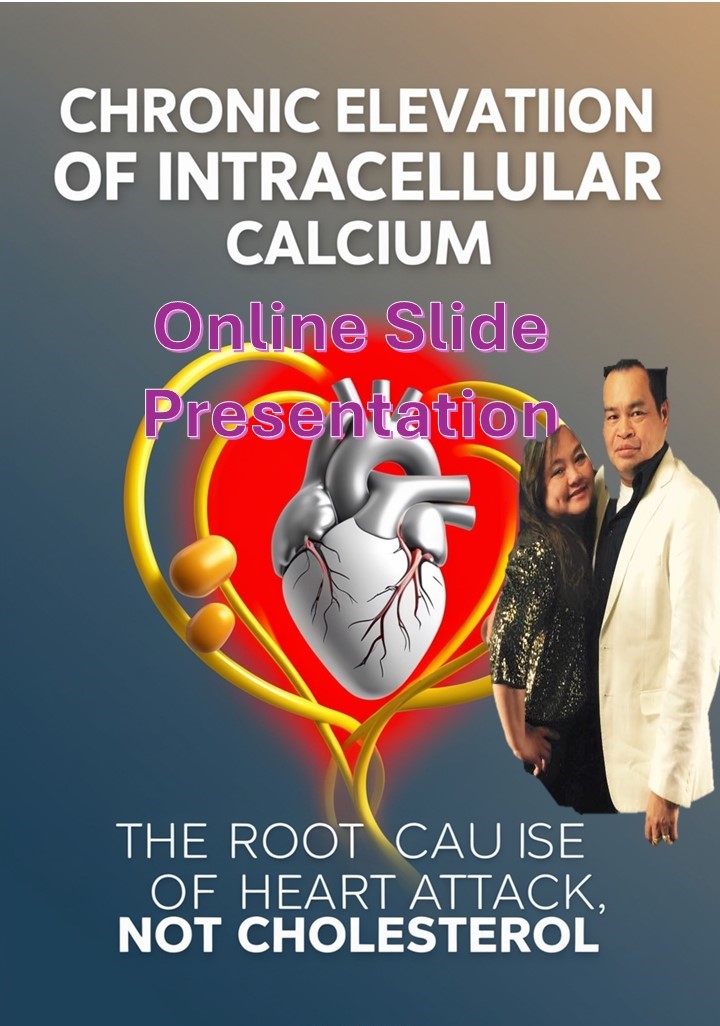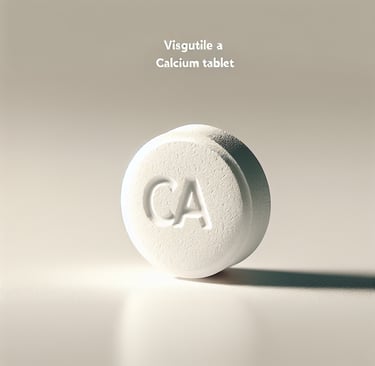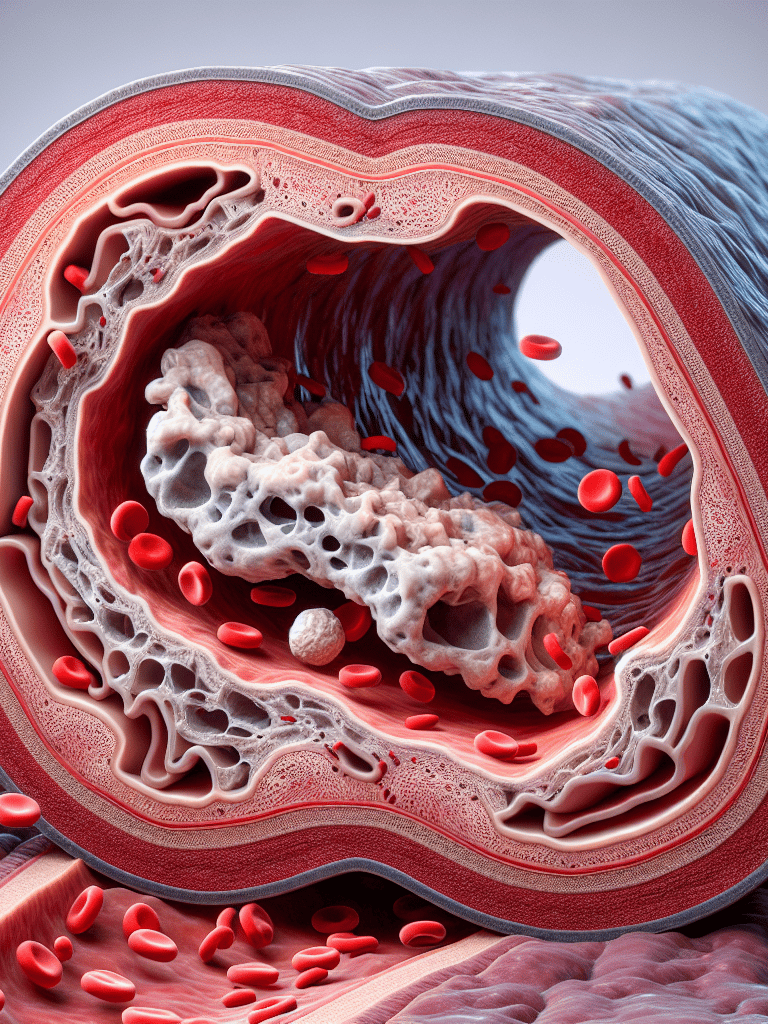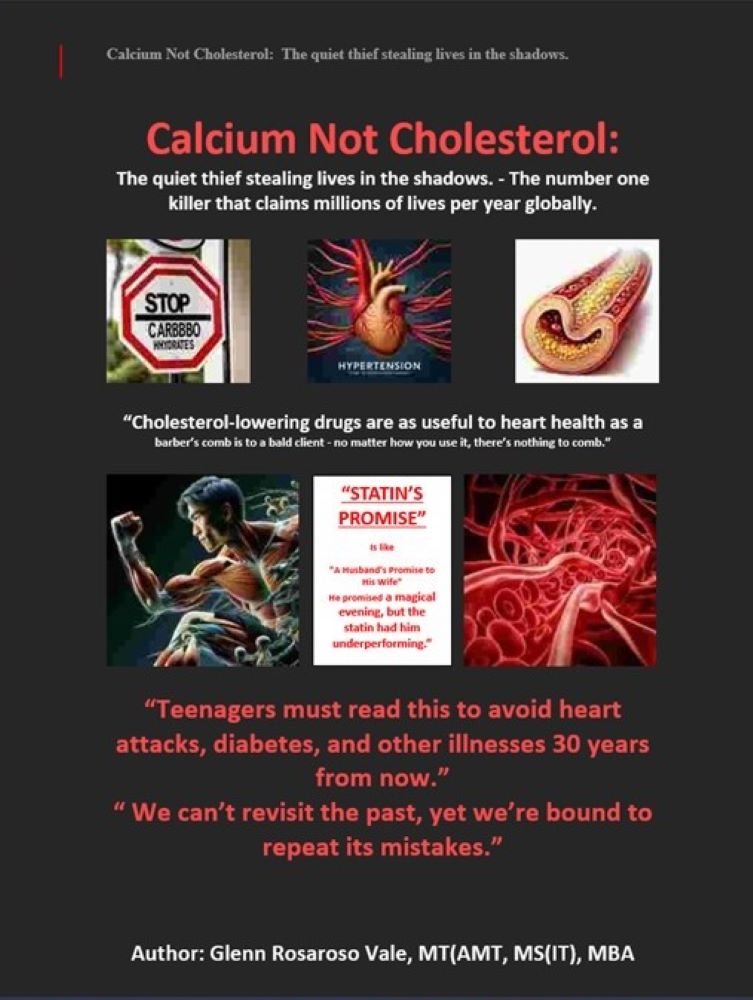"Uncover the truth behind the groundbreaking discovery of the causes of the world's biggest problems. 'The Root Causes' will change how you view the world!"
Chronic elevation of intracellular calcium is the root cause of heart attack not cholesterol
Discover the hidden truth behind heart disease, challenging the traditional focus on cholesterol. Emerging research reveals that excessive carbohydrates, mitochondrial dysfunction, and calcium overload play a pivotal role in driving heart disease. Dr. Peter Dellanoy's insights highlight how excess glucose, processed through the polyol pathway, leads to sorbitol accumulation, mitochondrial damage, and increased calcium levels, which damage blood vessels and promote inflammation. This new understanding shifts the focus from cholesterol to cellular health, urging a holistic approach to heart disease prevention through diet and lifestyle changes. Learn how managing carbohydrate intake, avoiding omega-6 rich seed oils, and minimizing toxin exposure can help regulate calcium levels, preserve mitochondrial function, and reduce the risk of cardiovascular diseases.
DISEASES
Glenn Rosaroso Vale,BSMT, MS(IT), MBA
1/5/202512 min read



It is not cholesterol as the cause of heart attack. It is the chronic elevation of intracellular calcium that precedes all events such as insulin resistance, oxidative stress, and inflammation. Insulin resistance is merely a symptom, not the root cause, of the majority of chronic diseases.


This presentation is for you if
§Diabetic or prediabetic
§High blood pressure
§Any Insulin Resistance Complications
§CVD
§Alzheimer’s
§Cancer
§For young healthy individual who cares to preserve a good quality of life 10, 20, 30 years from now


2. Disclaimer
•Glenn Rosaroso Vale is not a doctor, but I have worked in the medical field for over 35 years in the laboratory. The information shared in this webinar is for informational purposes only and should not be taken as professional medical advice or recommendations. Please consult your healthcare provider before making any changes to your lifestyle or medical regimen based on this information."
•"The presenter and RootCausePrevention.com take no responsibility for any actions you may take based on the content presented in this webinar or the website. The information provided is meant to educate and inspire, not to diagnose, treat, or cure any medical conditions. Please always seek the advice of your physician or healthcare provider before acting on any information presented here."


Empower Yourself to Lead The Right Path To Heart Attack Prevention


3. Meet The presenter
Welcome You All in This Presentation
·My name is Glenn Rosaroso Vale, BSMT( MS(IT), MBA
·I have been in the medical field for more than 35 years
·Personal health challenges passionately motivate me to share with the world
Understanding the real root cause of a heart attack is vital for both prevention and effective management. Heart attacks (myocardial infarctions) occur when the blood flow to a part of the heart muscle is blocked, leading to damage or death of the muscle. However, the causes and risk factors contributing to this event are multifactorial, and pinpointing the root cause allows for targeted interventions to reduce the risk of occurrence and recurrence.


4. What CAUSES HEART ATTACK?
The Hidden Truth Behind Heart Disease: The Role of Excess Carbohydrates, Mitochondrial Dysfunction, and Calcium Overload
When most people think about heart disease and heart attacks, cholesterol often takes center stage as the main culprit. However, emerging research is challenging this traditional view and suggesting that the real cause of heart disease may be far more complex—rooted in the chronic elevation of intracellular calcium levels. This growing body of evidence reveals how our bodies process carbohydrates, how mitochondrial dysfunction is involved, and how excess calcium plays a pivotal role in driving heart disease.
The Role of Excess Carbohydrates in Cellular Health
Dr. Gary Fettke from Australia has highlighted the harmful effects of consuming carbohydrates in excess—particularly when carbohydrate intake exceeds 4 grams at a time. According to another brilliant doctor, Dr. Peter Dellanoy, anything beyond this threshold triggers a cascade of metabolic processes that damage our cells. The body breaks down these carbohydrates into glucose, and when glucose levels in the bloodstream surpass 90 mg/dL, it sets off a biochemical process with significant health consequences.
The body processes this excess glucose primarily through two pathways: the glucokinase pathway, which converts glucose into ATP (the energy molecule of cells), and the polyol pathway. As Dr. Dellanoy explains, around 30% of the excess glucose is converted to ATP through glucokinase, but the remaining 70% enters the polyol pathway, where glucose is converted into sorbitol. While sorbitol is not harmful in small amounts, its accumulation within cells triggers serious problems.
Sorbitol Accumulation and Mitochondrial Dysfunction
The polyol pathway’s conversion of glucose into sorbitol introduces a crucial issue. Sorbitol has osmotic properties, meaning it pulls water into the cells, which leads to an influx of calcium ions. This increase in intracellular calcium activates various signaling pathways and can cause significant damage to cellular structures—particularly the mitochondria.
Mitochondria rely on a careful balance of calcium ions for optimal function. When this balance is disturbed due to elevated calcium levels, mitochondrial dysfunction occurs. Mitochondria struggle to produce ATP, the energy currency of the cell, which leads to fatigue, cellular inefficiency, and a range of health issues. As mitochondrial function deteriorates, cellular energy production decreases, resulting in fatigue and other symptoms that signal deeper metabolic issues.
Endothelial Dysfunction and Heart Disease
Endothelial cells, which line blood vessels, are crucial for regulating blood flow and maintaining healthy blood pressure. These cells normally produce nitric oxide (NO), a molecule that helps relax blood vessels and regulate blood flow. However, when mitochondrial dysfunction and elevated intracellular calcium overwhelm these cells, the production of nitric oxide is reduced, leading to blood vessel constriction (vasoconstriction). This raises blood pressure—an established risk factor for cardiovascular diseases such as heart attacks and strokes.
Furthermore, high calcium levels in endothelial cells can lead to oxidative stress, which damages the glycocalyx (the sugar coating on blood vessel walls), causing inflammation and promoting plaque buildup in the arteries. Over time, this can cause artery hardening, increasing the risk of blockages and, ultimately, myocardial infarction (heart attack).
The Impact of Seed Oils and Omega-6 Fatty Acids
Dietary factors like seed oils, which are high in omega-6 fatty acids, can further exacerbate this situation. One critical aspect of omega-6 fatty acids is that they can be converted into arachidonic acid, a pro-inflammatory molecule. In the presence of elevated calcium levels, arachidonic acid is converted into inflammatory eicosanoids such as prostaglandins (PGH2), leukotrienes, and thromboxane. These molecules are directly involved in promoting inflammation, vascular constriction, and the formation of blood clots—all of which contribute to heart disease.
Thromboxane synthase, an enzyme involved in blood clot formation, is particularly sensitive to calcium. In the presence of elevated intracellular calcium, thromboxane synthase activity is upregulated, leading to an increased production of thromboxane. This, in turn, increases the risk of blood clot formation, which can obstruct blood vessels and lead to a myocardial infarction (heart attack). The link between calcium overload, thromboxane production, and blood clotting highlights a critical pathway in heart disease development.
The Role of Environmental Toxins
Environmental toxins also play a role in increasing intracellular calcium levels and exacerbating the health risks associated with mitochondrial dysfunction. Substances such as MSG, artificial sweeteners, and microplastics (phthalates) have been shown to interfere with normal cellular function. These toxins disrupt the normal regulation of calcium within cells, further elevating calcium levels and contributing to the inflammation and oxidative stress that drive heart disease.
The Importance of Calcium Regulation in Preventing Disease
The central insight emerging from this research is that calcium regulation is essential for maintaining cellular health and preventing chronic disease. When calcium levels are dysregulated—whether through excess carbohydrate intake, the consumption of omega-6 rich seed oils, or exposure to environmental toxins—the result is a cascade of detrimental effects. This includes mitochondrial dysfunction, endothelial cell damage, oxidative stress, and the promotion of blood clotting. The upregulation of thromboxane synthase and the production of inflammatory eicosanoids make it clear that excess calcium in the body contributes to heart disease, stroke, and other cardiovascular events.
A Holistic Approach to Heart Health
To protect ourselves from the harmful effects of excessive calcium, we must focus on managing calcium levels through diet and lifestyle. This means reducing the intake of high-carbohydrate foods that spike blood glucose, avoiding seed oils that contribute to inflammation, and minimizing exposure to toxins that disrupt cellular function. By addressing these factors, we can regulate intracellular calcium, reduce inflammation, and protect our mitochondria from dysfunction.
In Conclusion
The traditional focus on cholesterol as the primary cause of heart disease has led to a narrow understanding of the condition. However, the true cause may lie deeper in cellular processes, particularly in the elevation of intracellular calcium levels, triggered by excessive carbohydrate intake and the consumption of omega-6 rich seed oils. The polyol pathway, which converts excess glucose into sorbitol, contributes to this problem, leading to mitochondrial dysfunction, oxidative stress, and the eventual breakdown of endothelial cells that line our blood vessels.
By understanding the mechanisms behind calcium overload and the harmful effects of dietary choices, we can take proactive steps to reduce our risk of chronic diseases like heart disease. Embracing this knowledge offers a more holistic approach to health—one that goes beyond cholesterol and focuses on the regulation of calcium, the preservation of mitochondrial function, and the prevention of inflammation.
We owe much of this insight to the work of Dr. Peter Dellanoy, whose research has helped shed light on the critical role of glucose metabolism and the polyol pathway in mitochondrial dysfunction. Through conscious dietary choices and a deeper understanding of how our cells function, we can reduce the risk of heart disease and protect our long-term health.
Is Cholesterol Really the Cause of Heart Disease? Uncovering the Truth Behind Heart Health
Why Statins Might Not Be the Solution: Understanding the Role of CoQ10 and Biochemical Balance
Could Inflammation and Oxidative Stress from the Chronic Elevation of Intracellular Calcium Be the True Culprits Behind Heart Attacks? Exploring the Root Causes
For decades, the medical community has focused on cholesterol as the primary culprit behind heart disease. Statin drugs, which lower cholesterol, are prescribed to millions of people worldwide with the belief that by reducing cholesterol levels, heart attacks and strokes can be prevented. However, recent scientific advancements have begun to expose a significant flaw in this narrative: we’ve been treating the wrong molecule.
Cholesterol itself is not the villain it's often made out to be. In fact, cholesterol is essential for numerous bodily functions, including the production of hormones, cell membranes, and vitamin D. Instead of cholesterol being the direct cause of heart disease, it’s more about how cholesterol behaves in the body and the underlying factors that affect its behavior. The real issue lies in the biochemical processes that produce and regulate cholesterol, as well as the molecules involved in these processes. Doctors are targeting the wrong culprit. It is not cholesterol that causes heart attacks; it's inflammation and oxidative stress.
One of the key molecules in question is Coenzyme Q10 (CoQ10), which is produced in the same metabolic pathway as cholesterol. CoQ10 plays a critical role in the production of energy within cells, particularly in the mitochondria. It acts like a "spark plug" for cellular energy, helping to produce ATP, the energy currency of the body. When statins lower cholesterol, they also inhibit the production of CoQ10. This reduction can lead to fatigue, muscle pain, and weakness—common side effects of statin use.
Furthermore, the mevalonate pathway, which is responsible for producing cholesterol, also produces other important molecules like dolichol (which is crucial for insulin sensitivity) and geranylgeranyl pyrophosphate, a molecule necessary for Vitamin K2 conversion. By disrupting this pathway, statins not only impact cholesterol levels but also create imbalances that can lead to diabetes, bone health issues, and an increased risk of heart attacks due to depleted Vitamin K2.
When statins lower LDL cholesterol, they might inadvertently lead to a reduction in testosterone production, contributing to symptoms such as low energy, loss of libido, and erectile dysfunction. While cholesterol levels are lowered, the overall biochemical balance of the body is disturbed, resulting in a cascade of unintended consequences.
Instead of focusing solely on cholesterol levels, we should be addressing the root causes of heart disease, such as inflammation, oxidative stress, and the overall biochemical health of the body. It's crucial to understand that cholesterol itself is not inherently harmful—it's the way the body processes and manages cholesterol that matters. By redirecting attention away from merely reducing cholesterol and instead focusing on improving the health of the entire metabolic system, we can find more effective and holistic solutions for heart disease prevention.
In conclusion, The Cholesterol Lie suggests that treating the wrong molecule—cholesterol—has misled both patients and doctors, leading to the widespread use of statin drugs with potential harmful side effects. It’s time to rethink our approach to heart health and focus on what truly matters in maintaining a healthy and balanced body.
why cholesterol is a myth? why is cholesterol is a lie?
The Birth of a Lie
In the 1950s, an influential physiologist named Ancel Keys introduced his Lipid Hypothesis, asserting that eating a high-cholesterol diet could lead to heart attacks. To support his hypothesis, he conducted a study involving 22 countries. However, after gathering the data, he discovered that the results were scattered and did not produce a strong correlation. In response, he cherry-picked only 7 countries whose data aligned with his belief and discarded the 15 countries whose data did not match. By eliminating these 15 countries, the remaining 7 countries strongly supported his hypothesis, and his findings were popularized worldwide. The idea that cholesterol causes heart attacks spread like wildfire. Had the data been fully reported and not manipulated, the Lipid Hypothesis would never have existed.
When President Eisenhower suffered heart problems, his cardiologist was familiar with Ancel Keys' work, which led to the Lipid Hypothesis being adopted into U.S. food policy. It was endorsed by the USDA (United States Department of Agriculture) and the AHA (American Heart Association) in the food pyramid, which recommended a low-cholesterol diet.
In the 1980s, statins were developed to lower cholesterol, giving rise to a trillion-dollar statin industry. Even though these drugs targeted the wrong molecule, it didn’t matter because profits were made at the expense of public health.
In 2016, the leading investigator on Ancel Keys' death discovered a hidden document in a basement, related to a heart study called the Minnesota Coronary Experiment (MCE), which had been kept secret for 43 years. The findings of the MCE were never published. In his study, Keys initially aimed to demonstrate that reducing cholesterol could reduce heart attacks. However, the results of the MCE showed that reducing cholesterol did not decrease the mortality rate; in fact, it actually increased the mortality rate. People with LDL levels between 100-189 lived longer compared to people with normal or lower LDL cholesterol levels. The study revealed that for every 30 mg/dL reduction in LDL, there was a 22% increase in heart attacks, meaning that the lower your cholesterol, the shorter your life.
This study shows there is no benefit to lowering cholesterol—it’s a waste of time, money, and jeopardizes your health.
We hsve been lied for 43 years.
Instead of focusing cholesterol to treat cardiovascular disease, just focus on inflammation and oxidative stress by tightly regulating intracellular calcium homeostasis
Marites albano
I am a cancer patient, stage 3 1/2. It has now metastasized to my lungs, and I want to live longer. I'm glad I was able to talk to Glenn Vale about my diet plan. In conjunction with my treatment and diet plan, I believe I have a chance to survive. I feel good so far, and I will continue with my diet plan. By following these guidelines, I have also reduced my risk of heart attack, which gives me hope for a healthier future. Thank you, Glenn Vale.


testimony
Aimee P. Panisal
I used to be big. I decided to follow Glenn’s diet plan and the book Calcium Not Cholesterol: The Silent Thief Stealing Millions of Lives Globally, which teaches me what to eat and what not to eat. I lost 60 lbs and feel great. I do not have any chronic diseases, including heart disease, and I thank God for that. By following these guidelines, I have reduced my risk of heart attacks and other health issues, which has made a significant difference in my life.


testimony
RhenRen Yap
I used to be big-built, and I would eat whatever I wanted and feel great, until I developed obstructive jaundice. Now, I have decided to follow the advice in Glenn Vale's book The Twin Devils That Sabotage Our Health and his other book Calcium Not Cholesterol: The Silent Thief Stealing Millions of Lives Globally, and it has made a big difference.


testimony
nikki martinez
My name is Nikki Martinez, and I am diabetic, a condition that runs in my family. I am aware that diabetes is a major risk factor for heart attacks. As I have children to care for, it is important to me to stay healthy. I have been following Glenn Vale's information, and I highly recommend his book Calcium Not Cholesterol: The Silent Thief Stealing Millions of Lives Globally. It is a must-read for anyone looking to prevent heart attacks in the future.


testimony
Introducing My Book: calcium not cholesterol: The quiet THIEF STEALING LIVES IN THE SHADOW. THE NUMBER ONE KILLER THAT CLAIMS MILLIONS OF LIVES PER YEAR GLOBALLY.
The book emphasizes a step-by-step approach to health and wellness, making it a comprehensive guide for those serious about making lasting changes to their health.
This book will show you how to prevent a heart attack naturally, helping you regulate and understand the ions that trigger the initial pathological reactions in the body.
Act now—don’t wait. Heart disease is sneaky and progressive.
Some of you may feel fine today, but deep inside, your body could be slowly deteriorating. By the time symptoms appear, it might be too late. Many young individuals die from heart attacks, and I don’t want that to happen to any of you.
13. Get the E-Book Today & Take Action
Buy now—heart disease is a sneaky and progressive condition. You may feel fine today, but over time, the risks increase, and by the time symptoms appear, it might be too late. Don’t wait until it’s too late—take action now to prevent a heart attack and avoid the severe consequences of heart disease, which can strike when you least expect it.
Thank
you FOR WATCHING THE presentation AND CLICK THE LINK TO PURCHASE THE BOOK
Glenn Rosaroso Vale, BSMT, MS(IT), MBA
903-268-6664
Health
Understanding illness to empower your well-being journey.
Wellness
Knowledge
info@rootcauseprevention.com
903-268-6664
© 2024. All rights reserved.
grfv@sbcgloal.net

